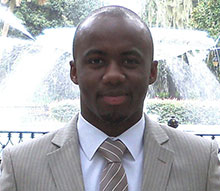STEM Careers: Electrical Engineer
Electrical Engineers solve problems related to electricity. Some are involved in creating electronics and appliances that use less energy.
Meet Ifeanyi Igwulu.

Image courtesy of Ifeanyi Igwulu
"I am an electrical engineer and I work for the Department of Defense. I use science and engineering to set up and troubleshoot command, control, and communications systems that enable our troops to stay connected in the battle space and in sync during field operations. We design our systems to be energy efficient, because this increases overall system availability."
-Ifeanyi Igwulu, Electrical Engineer


